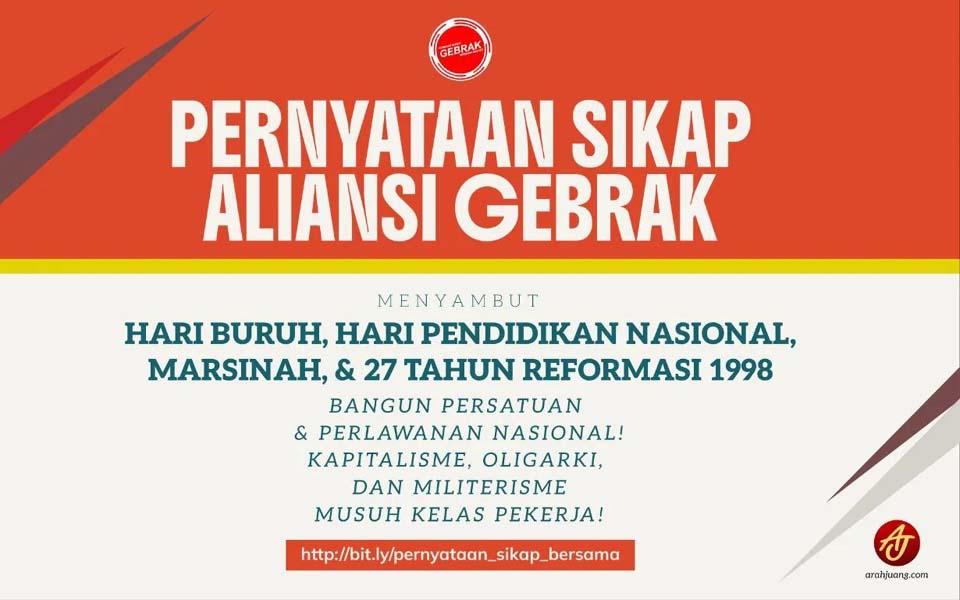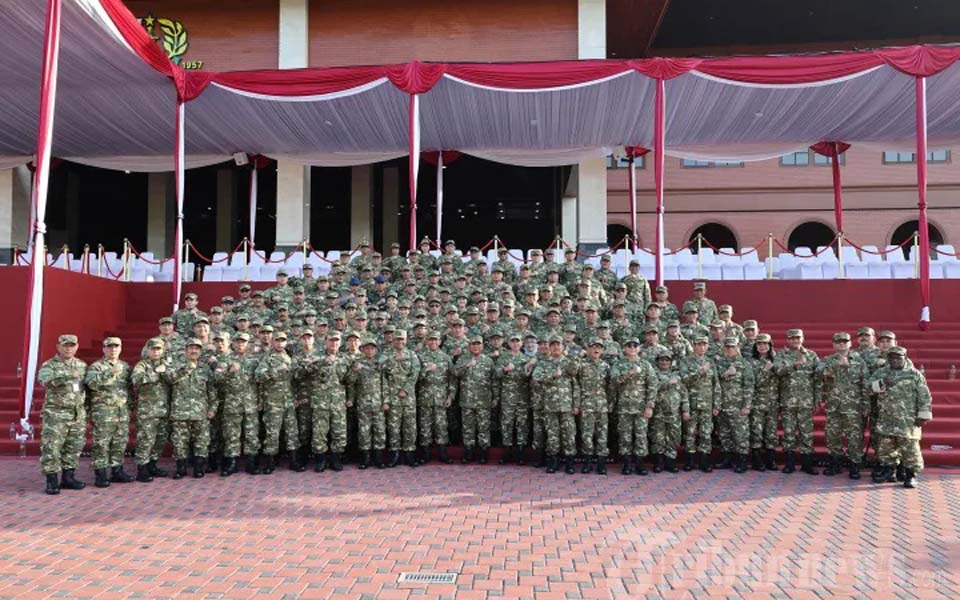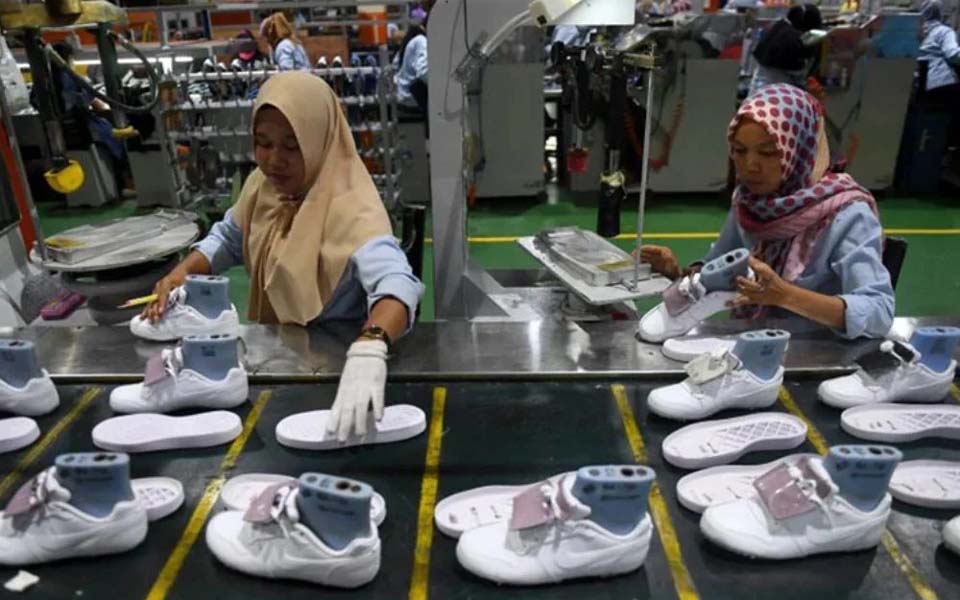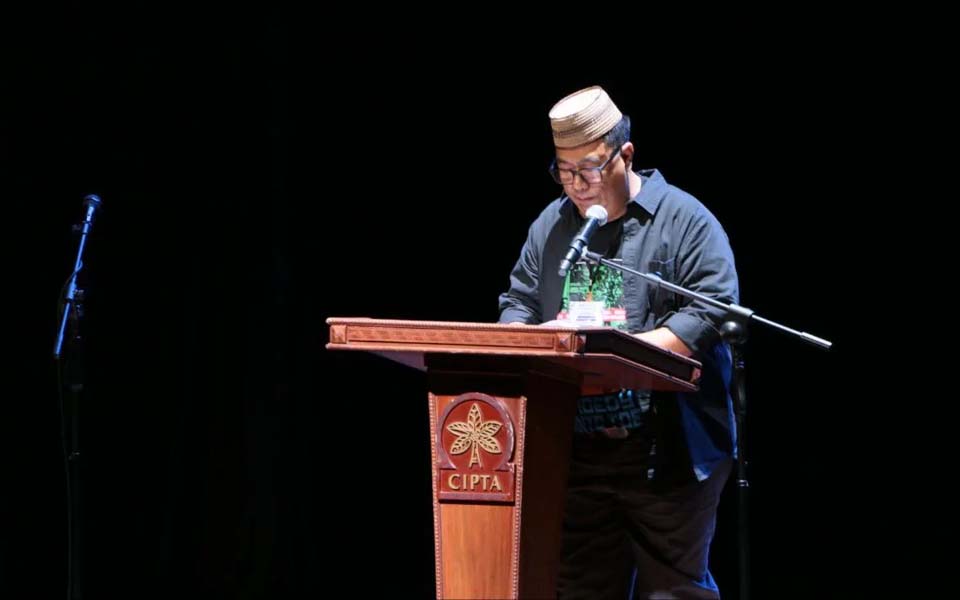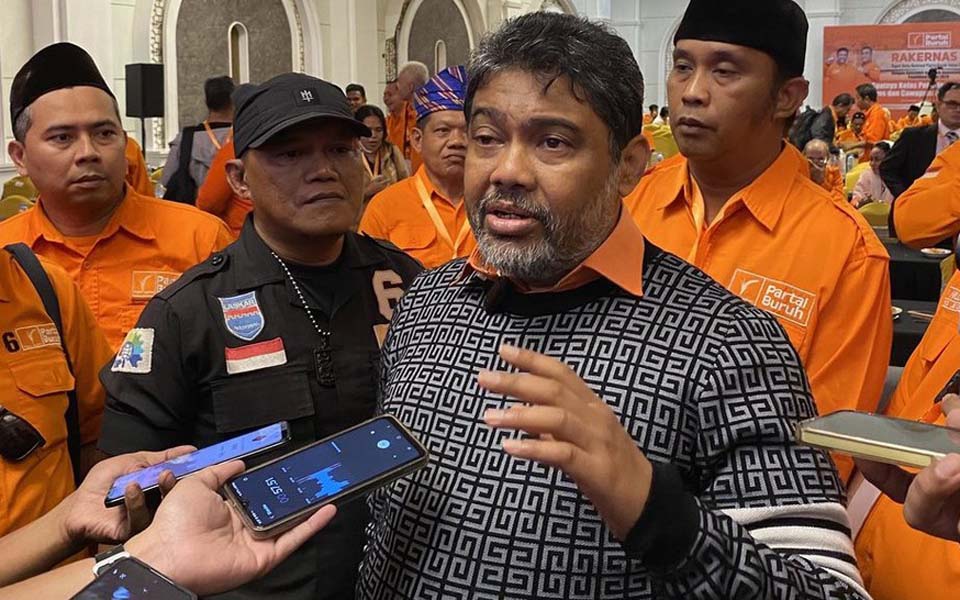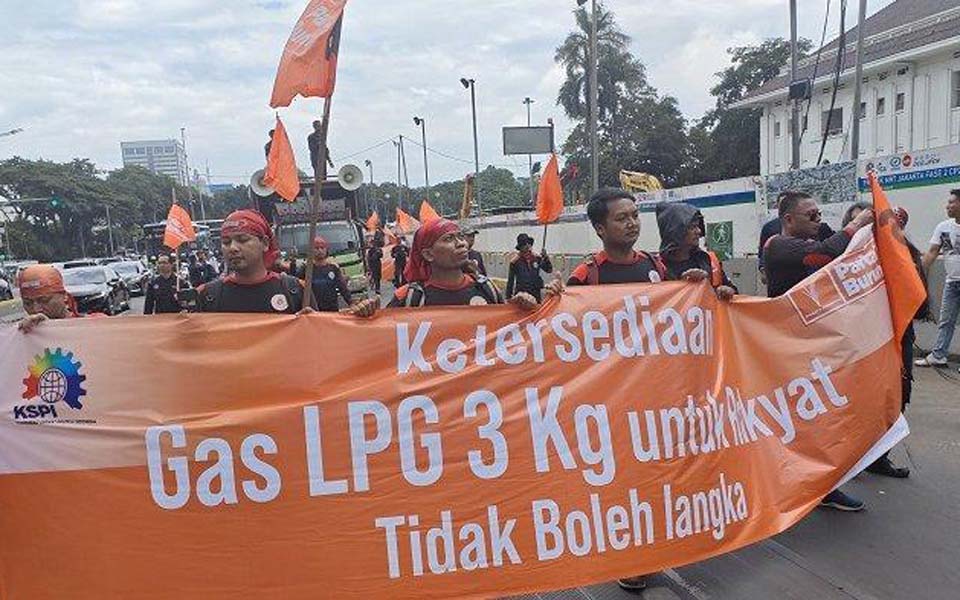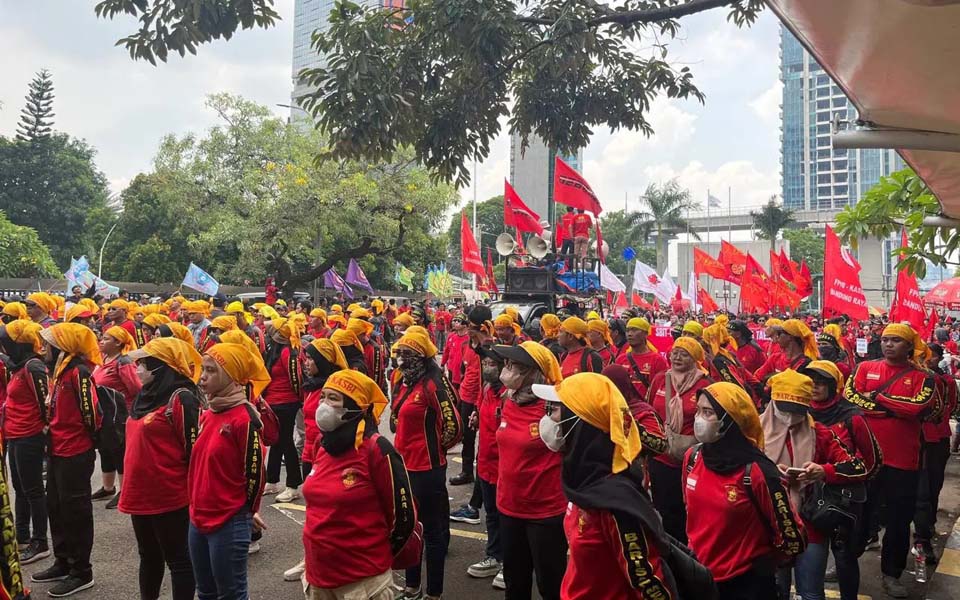[The following is a translation of a statement by the Labour Movement with the People (GEBRAK) welcoming International Labour Day, National Education Day, Marsinah Day and 27 Years of Reformasi 1998.]
International Labour Day (May Day) is just around the corner! Along with it, in Indonesia a series of commemorations of resistance in May will also follow! National Education Day, the murder of labour activist Marsinah in 1993, the 1998 Trisakti Tragedy and also the 1998 Pogrom. Tragedy after tragedy. We interpret this together as a symbol of the ordinary people's resistance against the Suharto military regime.
Yes, 27 years ago, along with the fall of former president Suharto, the power of the military also fell. Democratic space was opened up. Workers could freely form trade unions. Farmers could freely give birth to their unions. Launching actions to occupy factories or land to demand their rights was no longer faced with the muzzle of ABRI's (as the Indonesian Military was known) guns.
But today, the remnants of the New Order continue to be embraced by the pseudo-reformist elites. The hands of the generals are covered in blood, the hands that abducted Wiji Thukul, Dedi Hamdun and 11 other comrades who are still missing to this day, the hands that killed Marsinah, the hands that blocked the factory strikes in the New Order era with the muzzle of a gun, are back at the helm of the country. The regime of President Prabowo Subianto and Vice President Gibran Rakabuming Raka has succeeded in evenly consolidating elites from all groups.
It is not without reason that workers declare that the people's democracy is experiencing a retreat. Experiencing a "bell-turn" of autocracy, caused by policies and manoeuvres by the elite in power over the last 10 years that indicate an erosion of democracy. After reformasi – the political reform process that began in 1998 – Indonesia experienced significant economic and political liberalisation. This however also paved the way for neo-liberalism and the reconsolidation of military power. Policies in the eras of former presidents Megawati Sukarnoputri and Susilo Bambang Yudhoyono (SBY) showed this tendency, backed by the encouragement of international financial institutions to create a "friendly" investment climate.
The 2005 Infrastructure Summit, hosted by Yudhoyono, was a major turning point. The summit resulted in controversial land policy changes, such as Presidential Regulation Number 36/2005 and Law Number 2/2012, which strengthened state authority in land acquisition for the public interest. In Yudhoyono's second term, the Master Plan for the Acceleration and Expansion of Indonesia's Economic Development (MP3EI) was launched, focusing on the exploitation of natural resources and labour. This policy was continued by Prabowo's predecessor president Joko "Jokowi" Widodo through National Strategic Projects (PSN), which further strengthened the state's role in facilitating investment.
As a result, mass layoffs continue to hit the working class. This is not only caused by the periodic crisis of capitalism, but is also the result of labour market flexibility policies born by regime after regime during the reformasi era that pursued a neoliberal agenda such as the ratification of the Omnibus Law on Job Creation (UU Cipta Karja). It is clear that layoffs over the last three years have increased drastically.
This neoliberal political and economic direction has also had an impact on poor rural communities where land grabbing occurs on a massive scale which perpetuates the trend of homelessness. We also see clearly, in the context of today's multidimensional crises – from food, energy to the climate – women bear an increasingly heavy burden of care giving labour. The heavy burden on the people to answer these problems is reinforced by education that is getting more expensive every year. Cutting off access for the younger generation to find scientific solutions that are in accordance with the urgent needs of the ordinary people.
The blocking of scientific knowledge, the perpetuation of low-wage politics, the exclusion of women, the climate crisis, and all the other problems the people face have clearly not been responded to by opening up democratic space. Instead, it has paved the way for the military(ists) and the bourgeois civilian elite to reap as much profit as possible while they can. We can see this from the composition of positions that are divided evenly between the civilian and military elites in government ministries. Currently, the military also controls Prabowo's flagship Free Nutritious Meals (MBG) program, starting from holding positions in the National Nutrition Agency (BGN) to forming small business units or MSMEs to support the program.
The State Logistic Agency (Bulog) is also controlled by an active Indonesian Military (TNI) officer and mobilises soldiers to buy grain directly from farmers. History records that military mobilisation in the agricultural sector is no different from middlemen armed with guns. The Army is also establishing 100 development battalions and 22 new Regional Military Commands (Kodam) ready to be mobilised to face the "enemy from within" – meaning to face the ordinary Indonesian people themselves. The military has also formed a forest area control task force to plunder the livelihoods of indigenous peoples.
Not only does this have an impact on farmers, the strengthening of the military in the business sector will also hit the labour struggle in factories. An example of this is the struggle by workers at the company PT Duta Palma which is owned by Agrinas Palma Nusantara, a company under the control of a retired TNI officer.
First entering the villages, second entering the factories, and third TNI also began to push to into the universities, monitoring student consolidation meetings and discussions. Militarisation throughout the country! They share extractive projects with civilian bourgeoisie. They will also share the money from looting the budget through Prabowo's budget efficiency cuts that that will be channelled into the new sovereign wealth fund Danantara. Militarism in Indonesia is able to flourish because of the domestic bourgeoisie lack of faith in democracy due to capital's dependence on the muzzle of a gun.
The exploitation of nature with massive forest destruction will also occur in the future. Policies that continue to commodity Indonesia's forests issued during the Widodo regime legitimise forest destruction under the new Prabowo-Gibran regime. Since the announcement of Prabowo and Gibran as president and vice president-elect, the Indonesian Forum for the Environment (Walhi) has sounded the alarm bells over their leadership in terms of environmental safety and the safety of the people. Based on the Ministry of Forestry's strategic plan, it does not show a commitment to protecting forests and the ordinary people's rights. The food estate program that will clear some 3.69 million hectares of forest risks seizing land and people's sources of life that will displace indigenous and local communities.
Prabowo's statement dismissing the impact of palm oil on deforestation is misleading, especially considering the fact that 3.37 million hectares of palm oil plantations are located in forest areas. The plan to clear 20 million hectares of forest for food and energy is a new form of land grabbing in regions managed by the ordinary people. The majority of this land comes from forest areas and social forestry. The program has the potential to worsen agrarian conflicts and ecological degradation. Instead of addressing these problems, the government is directing the state apparatus or using a military approach to protect palm oil companies, increasing the risk of violence against the community through Presidential Regulation (Perpres) number 5/2025.
On International Labour Day 2025, the Labour Movement with the People (GEBRAK) declares that it is not the time for workers to join hands with the bourgeois elite who are cosying up to the military(ists). There is no other way but for the working class, farmers and rural communities, young people, as well as other marginalised groups to join hands. To build the broadest possible national democratic alliance to fight for our urgent demands today, namely:
- Eliminate all anti-democratic, anti-people legal products (the revised TNI Law and the planned revisions to the National Police Law and the Criminal Procedural Code)!
- Revoke the Omnibus Law on Job Creation Law and its derivative regulations, fight the storm of layoffs, pass the pro-worker labour law and provide certainty and guarantees of decent work for workers!
- Enact the Draft Law on the Protection of Domestic Workers (RUU PPRT) now, legal guarantees for domestic workers are absolute!
- Implement genuine agrarian reform: land and agricultural technology for small farmers!
- Arrest, prosecute and imprison the human rights violating generals!
- Disband the TNI's territorial command structure!
- Cut the budget for the Ministry of Defence, the National Police, the Attorney General's Office and the State Intelligence Agency (BIN), confiscate military business assets! For education, health and public subsidies.
- Reject the military entering campuses, factories and villages! Reject the military interfering in civil affairs! Return the military to the barracks!
- Eliminate the partnership labour system and recognise online motorcycle and car drivers as formal workers.
In order to achieve these demands, GEBRAK as an alliance consisting of trade unions, students, farmers and the urban poor believes that protest actions must continue to be carried out throughout the country. Therefore, we call on all elements of the labour and people's movements throughout the country to:
- Consolidate ourselves, let us unite together to build national unity for the welfare of the Indonesian people.
- This unity must be built on the basis of anti-oligarchy and militarism in every region, city, campus, industrial area and village.
- Take action on May 1 (International Labour Day), May 2 (National Education Day), May 8 (Marsinah Day: Indonesian Labour Hero) and May 21 (Reformasi 1998).
- Launch preparatory actions in mass bases such as campuses, factories, industrial areas, villages and all corners of the country. These actions can be in the form of demonstrations, mass meetings, free speech forums, democracy platforms etc.
- Carrying out propaganda on today's pressing problems of the people, namely capitalism, the oligarchy and militarism, and the impact of the damage that has occurred to the ordinary people in cities and villages.
Unity built nationally, radicalisation growing in the regions, are the main foundation for building a real alternative political force against the oligarchy and militarism. In the end, this is our politics to against theirs, politics here against there, the politics of workers and the ordinary people against the political elite. Political unity is the foundation for seizing power and implementing policies for the benefit workers and the people.
Come on, all comrades, organisations, alliances, groups, communities and individuals who are progressive democratic or socialist, support and sign this statement at: http://bit.ly/pernyataan_sikap_bersama.
Initiated by:
- The Labour Movement with the People (GEBRAK)
- Indonesian Trade Union Congress Alliance (KASBI) confederation
- Confederation of United Indonesian Workers (KPBI)
- National Trade Union Confederation (KSN)
- National Labour Movement Centre (SGBN)
- Banking Trade Union Communication Network (Jarkom SP Perbankan)
- Agrarian Reform Consortium (KPA)
- Progressive Students School (SEMPRO)
- Indonesian Students Union (SMI)
- Indonesian Student League for Democracy (LMID)
- Free Women (Perempuan Mahardhika)
- Indonesian High-School Students Federation (FIJAR)
- Jakarta Legal Aid Foundation (LBH Jakarta)
- Indonesian Legal Aid Foundation (YLBHI)
- United People's Struggle (KPR)
- Indonesian Workers Federation of Struggle (FPBI)
- Food and Beverage Trade Union Federation (FSBMM)
- Independent Trade Union Federation (FSPM)
- Industry Workers Federation (FKI)
- Indonesian Transport Workers Union (SPAI)
- Indonesian Forum for the Environment (Walhi)
- Greenpeace Indonesia (GP)
- Trend Asia (TA)
- Association of Independent Journalists (AJI)
- Commission for Missing Persons and Victims of Violence (Kontras)
- Jentera College of Law Student Executive Council (BEM STIH Jentera)
- Campus Employees Union (SPK)
- Amartya House
- Sedane Labour Resource Centre (LIPS)
- Indonesian Revolutionary Education Committee (KRPI)
- Indonesian Healthcare Workers and Medical Employees Trade Union (KSPMTKI)
- Socialist Union (PS)
- Resistance Jakarta
- Student Struggle Centre for National Liberation (PEMBEBASAN)
- People's Liberation Party (PPR)
Supported by:
- Bandung Socialist Youth Organisation (KP OKMS)
- Bojonegoro Socialist Youth League (LPS)
- Yogyakarta Socialist Study Circle (LSS)
- Samarinda People's Study Circle (LSK)
- Balikpapan Cross Communal
[Translated by James Balowski. The original title of the article was "Pernyataan Sikap GEBRAK: Kapitalisme, Oligarki dan Militerisme Musuh Kelas Pekerja! Bangun Persatuan dan Perlawanan Nasional!".]





